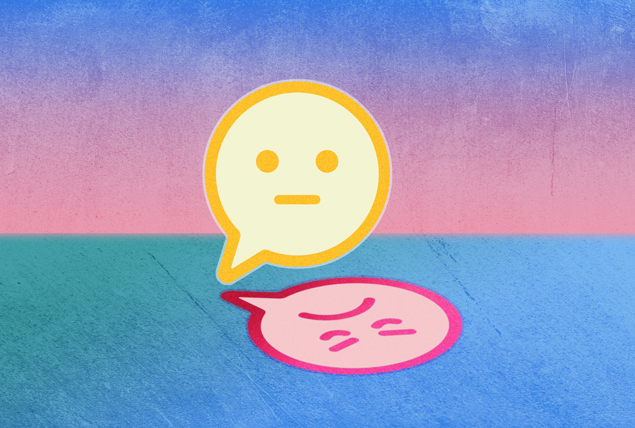How Passive-Aggressive Behavior Can Ruin Your Relationship

It might seem as though anger is something you should avoid, especially if you're snapping at your partner about something that happened at work. But even if you aren't prone to angry outbursts, negative emotions like hostility and disinterest can come out in other ways.
If you or your partner feels uncomfortable expressing emotions directly, you might engage in passive-aggressive behavior in an effort to regain control of the situation.
What is passive-aggressive behavior?
Passive-aggressive behavior can refer to comments and questions that imply someone doesn't like something or is upset, without them actually saying they're upset, said Elizabeth Fedrick, Ph.D., L.P.C., owner of Evolve Counseling & Behavioral Health Services in Phoenix.
For example, your partner might joke about a waiter messing up their lunch order and claim they're "just kidding." Or they might make snide remarks to cover up their frustration. Their words might sound as though nothing is wrong, but their facial expressions, body language and tone of voice suggest the opposite is true.
"This lack of alignment between what is being said and how it's being said creates confusion or uncertainty for the individual on the receiving end," Fedrick explained.
How can you tell if your partner is being passive-aggressive?
A partner who behaves in a passive-aggressive manner doesn't necessarily want the recipient to know they're engaging in this behavior. When they get called out, they may insist they're fine in spite of obvious signs that they aren't, said Michelle Felder, L.C.S.W., M.A., founder and CEO of Parenting Pathfinders, based in New York City.
In an argument, humor may be someone's go-to strategy for deflecting or concealing their emotions. Rather than being honest, they might resort to comments about their partner's appearance, abilities or identity that are masked as complimentary but lack sincerity, Felder said.
For example, if you're always running late, your partner might say, "You look really nice when you're not getting ready at the last minute." Besides humor or sarcasm, another tactic is withdrawing or isolating themselves by ghosting you, ignoring your requests or giving you the silent treatment.
Let's say your partner doesn't follow through on a promise to save money. When confronted, they might accuse you of being unreasonable or avoid telling you about a windfall, such as getting free concert tickets. Accordingly, their lack of responsiveness can carry over to neglecting commitments and withholding resources, Felder noted.
What's behind passive-aggressive behavior?
Some people are motivated by a desire to contain their anger or avoid conflict. In using humor or sarcasm, they might believe, either consciously or unconsciously, that they're doing less harm by suppressing their negative feelings, Felder said. It's how some people suppress their honest thoughts and feelings.
For others, it can be embarrassing to admit they're bothered by something. But in healthy relationships, addressing negative feelings is important for building intimacy.
When someone is engaging in passive-aggressive behavior, it's often because they want their partner to know they're upset, but they might not possess the necessary communication skills to express this in a healthy and effective way, Fedrick explained. Without the confidence to say how they feel, they'll try to find other ways to send this message that feel less threatening to them, Fedrick added.
Being vulnerable can be challenging if you've grown up in a family or culture where you didn't feel safe or comfortable expressing your emotions. Instead, you might have learned covert ways of expressing yourself. This is especially true if you're accustomed to people invalidating your feelings or treating your anger as unacceptable, Felder said. But it doesn't have to stay that way.
What's the harm of passive-aggressive behavior?
When you're in a relationship with a passive-aggressive partner, you can't be certain about their intentions. If they leave dirty dishes in the sink, you might question whether they did it on purpose or genuinely forgot to put them in the dishwasher.
As Felder explained, this constant state of uncertainty can chip away at the trust you've built as a couple, creating confusion and resentment. You might feel hurt or confused since there's no discussion about why your partner seems cold or distant.
"Passive-aggressive behavior can be more damaging to a relationship than clearly expressed anger," Felder said.
One reason for this is we tend to be more attuned to signs of anger, such as swearing, yelling or clenched fists. In such cases, we can try to deescalate the situation by taking deep breaths or stepping away from the conversation. With passive-aggressive behavior, what's lacking is clear and honest communication.
Getting to the root of the problem is necessary for finding a resolution and restoring trust, Fedrick explained. Both partners need to feel like they're in a safe and fulfilling relationship. Your relationship doesn't have to stay in this negative loop.
What can you do if your partner is passive-aggressive?
If you recognize this behavior in your partner and it's affecting your relationship, it's important to bring it to their attention. Otherwise, declining to have an open and honest conversation with them can be just as harmful as the passive-aggressive behavior itself, Fedrick said.
Be gentle in your approach and share with your partner how their behavior is affecting you and your relationship. Both Fedrick and Felder emphasized how helpful it can be to practice using "I" statements with your partner.
Here are some examples:
- I feel hurt when you ignore me when you are upset.
- I feel confused when you shut down communication, because you say you're fine.
- I feel helpless when you vent about your job. What I need is for you to tell me what I can do to help provide you with support.
Statements like these keep the conversation centered around your feelings and experience while helping you avoid judgments or opinions about your partner's character, Felder said. Another strategy for inviting communication is asking your partner, "Can you help me understand what happened or how you are feeling?" she added.
As you learn to recognize the signs of passive-aggressive behavior, you can ask your partner if they're OK with you pointing out the behavior and having a conversation. If they say no, you can reassure them that you're available to talk when they're ready, Fedrick said.
Seek professional support
Once your partner is aware of their actions, both of you can explore ways to help them feel more comfortable expressing their emotions, Fedrick said. If their behavior is becoming a regular occurrence, it might help to seek professional care to learn how to communicate more effectively and acquire the skills needed to assertively express when you're feeling hurt or upset, she added.
An outside perspective can be helpful for validating your feelings and taking care of your mental health, Felder explained. Consider reaching out to a friend, therapist, family member or someone else you trust. She also suggested couples counseling to help both partners understand communication patterns that affect the quality of their relationship.
However you decide to initiate this conversation, make sure it's coming from a place of love, not resentment. Be open to hearing your partner's feelings regardless of whether you agree.
"At the end of the day, we can only control ourselves and how we respond," Felder said.
The bottom line
You can help end the passive-aggressive relationship cycle. Speak with your partner, find ways to share your feelings and gain the support of a trusted therapist to help you and your partner work through your emotions and learn communication strategies in the process.
Are you in search of a new therapist or other healthcare professional? Giddy Telehealth provides access to hundreds of doctors in various specialties. Use the convenient online portal to find the help and support you need.


















